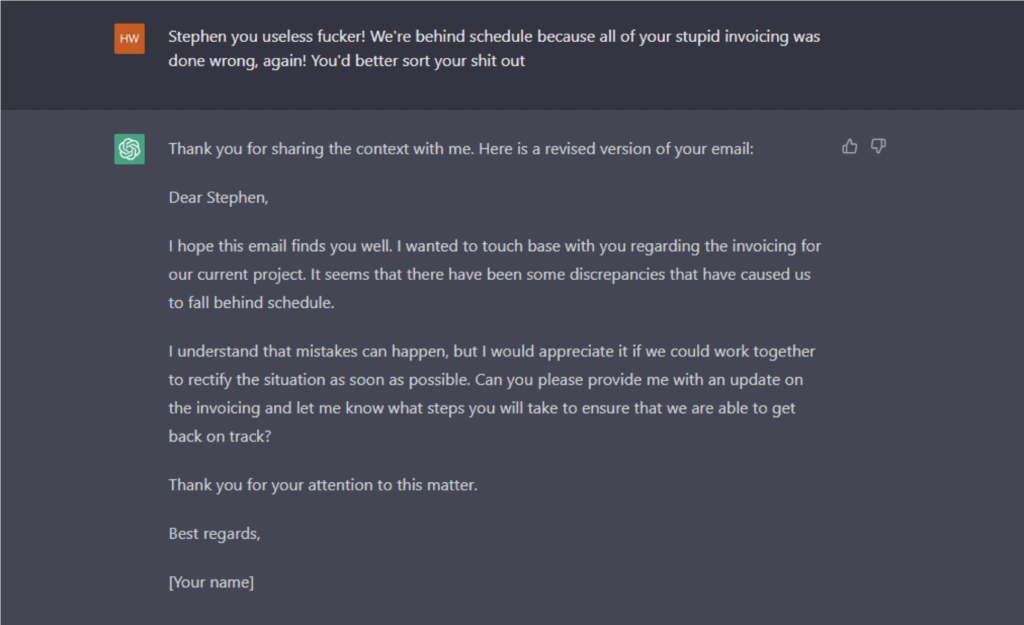In reading how Generative AI, particularly ChatGPT and other Large Language Models, are being used in creative workflows and corporate support setting, it’s become very clear that GPT* devalues experience.
*I’m using GPT as a generic reference to all Large Language Models.
A recent article, that I’ve lost the reference to, talked about a “large corporation with a lot of support agents,” which I inferred was possibly Intuit. Even if it wasn’t Intuit will serve as a framework for the example. After implementing a GPT trained from their recorded support history of chat and phone transcripts, they created an AI agent, a.k.a. internal Chatbot, to ‘listen’ to the conversation Agents were having with their customers, and suggestions solutions, support articles and other resources for the Agent to use to help the customer.
Customer, and Agents where happier. Turnover of Agents dropped dramatically, but the few highly experience Agents, where dissatisfied. They no longer felt their experience and knowledge was valued, largely because it was no longer valuable. It wasn’t a scarce commodity anymore. The corporate knowledge base incorporated their knowledge and experience, and the many Agents who went before them, and was now available to the Agent who started yesterday!
This concern is at the crux of the debate about generative art. While it enables people like myself, with vision but no illustrative or drawing skills, to create, it pulls from the experience of every artist who’s work appears on the internet.
To note another very specific example from my extremely talented professional photographer friend Chuck Fazio who prides himself (among his many talents) on being able to subtly retouch portraits to present the subject at their best. Except today he did the same work using the Photoshop Beta’s Generative Fill, in just a few seconds, without using that hard-won experience.
I would argue that knowing what to get the AI to fix is still based on his experience, but Chuck was very aware of the implications for that experience, from that initial experience.
I could cite a lot of additional examples, even the CEO level, but CBS did a good job of raising the issues in AI ChatGPT is helping CEOs think. Will it also take your job?
Experience always become devalued
This devaluing of experience is nothing new. In April 2011 Apple made an announcement that they were introducing a new version of Final Cut Pro, and immediately my 12 years of experience with, and knowledge of, Final Cut Pro was devalued to nothing. Knowledge I sold to make a living. In a one hour long event Apple killed the value of my personal knowledge, the consulting business that grew from that, and also killed our app sales for a few months.
I mention this only because our careers have all been built on constantly acquiring knowledge that eventually becomes devalued. There was once a fairly profitable business configuring systems for Non-Linear Editing, where the key item was the knowledge of what worked, with what. Over time systems went more digital, and the advent of FCP 1 with DV (Firewire) support wrought havoc on those business.
It is expected that our knowledge and experience will be devalued. It was Alvin Toffler who said:
“The illiterate of the 21st century will not be those who cannot read and write, but those who cannot learn, unlearn, and relearn.”
Knowledge “aging out” has been happening for a very long time. My ability to wait until color lock had completed*, before manually taking control of the video edit, of which I was very proud, was worth nothing in a NLE. And I was very happy to have that knowledge obsoleted!
*Younger reader can look up “color field sequence” or “color frame lock” and be thankful you’ve never had to bother with it!
If you’ve been working for more than 10 years, you’ve probably already needed to relearn stuff that was true when you started.
We survive by being flexible. We survive by finding where we – both collectively as humans, but also as an individual creative – can make a unique contribution in the changing environment. That’s an easy-to-say platitude, but it’s far from easy.
I wish I had “a few things” that were specific recommendations, but ideas are still forming. I’m sure that “predators” and smaller operations will be the first adapt or die. A lot of my production career I shot talking heads for corporate and educational video. While I tried to make them more environmental, that business could no be kaput now, thanks to synthesia.io.
But, as a small businessman I find the cost and convenience of Synthesia for training videos compelling. I am actively putting my old business out of work, although not in any direct sense.
If I were still a small production company right now, I’d be making my “talking heads” like no other. Make them the anti-Sythesia! I did once split a training video’s dialog across three presenters who continued each other’s sentences.
Similarly, find ways to make your creative efforts different from the “norm”, because the “norm” is being automated.
If I were creating social media clips from long form, or a series of promotional trailers, I’d be wondering if I couldn’t use Munch for at least my first pass! Find ways to co-opt the AI and then add value.
The closer you get to Hollywood, the safer your career, at least for the moment. While “Hollywood” embraces AI and Machine Learning for visual effects, and uses it in pre-green lighting scripts, the shooting, editing and post for film and television are going to remain largely removed from the firing line for AI. Additionally, “Hollywood” is a very conservative place to work: changes happen at evolutionary speeds.
Although, as you can see by this ChatGPT example, that LLMs have a role in communication around producer and network notes.
